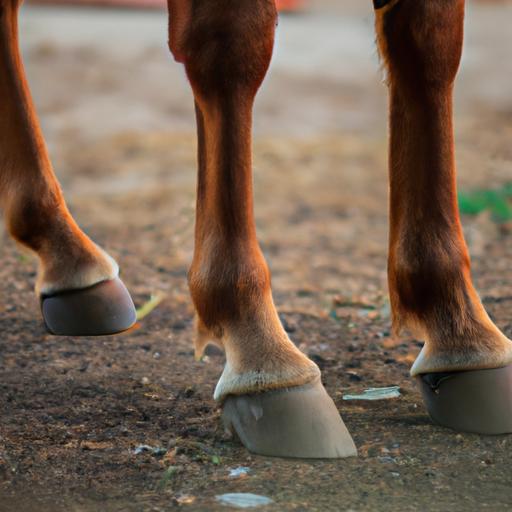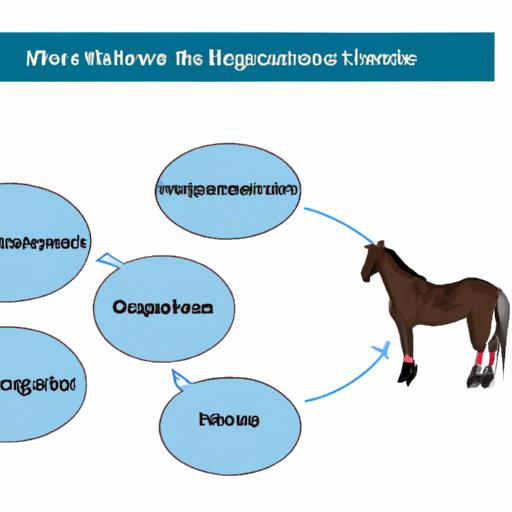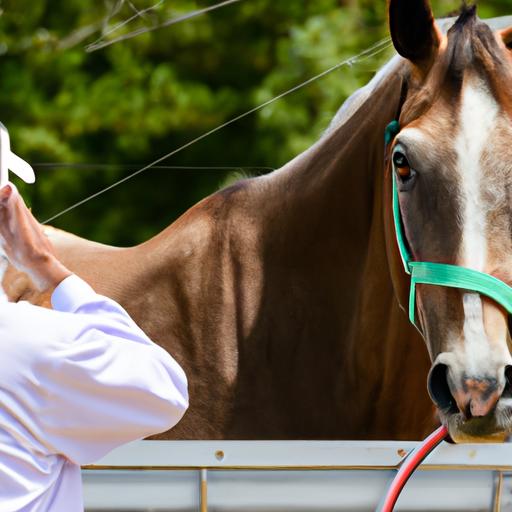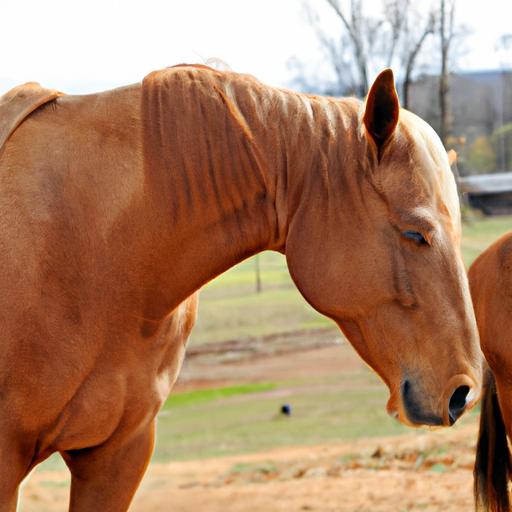Discover the importance of horse ulcer care for equine health. Learn about diagnosis, treatment, prevention, and long-term care strategies for optimal well-being.
Introduction

When it comes to the well-being of our beloved horses, we must address various health concerns they may encounter, including ulcers. Horse ulcers can have a significant impact on their overall health and performance. Understanding the importance of proper care and treatment for horse ulcers is crucial for every horse owner and enthusiast.
Horse ulcers, also known as equine gastric ulcers, are sores that develop in the delicate lining of a horse’s stomach. These ulcers can be caused by various factors, such as stress, improper diet, prolonged use of non-steroidal anti-inflammatory drugs (NSAIDs), or intense exercise. The impact of ulcers on equine health should not be underestimated, as they can lead to discomfort, weight loss, poor performance, and even behavioral issues.
It is our responsibility as caretakers to provide the necessary care and treatment to ensure our horses’ well-being and happiness. Neglecting horse ulcers can have long-lasting consequences, affecting their quality of life and hindering their performance in various activities, from competitive events to leisurely rides.
By proactively addressing horse ulcers, we not only alleviate their discomfort but also enhance their overall health. Providing the right care and treatment can greatly improve their ability to digest food properly, absorb nutrients efficiently, and maintain a healthy weight. Additionally, treating ulcers promptly can help prevent further complications and ensure a swift recovery for our equine companions.
In the following sections, we will delve deeper into the world of horse ulcers, exploring the different types, diagnosing techniques, treatment options, preventive measures, and long-term care strategies. Together, we will equip ourselves with the knowledge and tools necessary to provide the best care for our horses and optimize their well-being.
Remember, the journey towards effective horse ulcer care begins with understanding and acknowledging the significance of this health concern. So, let’s embark on this adventure and prioritize the health and happiness of our equine friends.
Stay tuned for the upcoming sections where we will explore horse ulcer types, diagnosing techniques, treatment options, preventive measures, and long-term care strategies. Let’s ensure our horses receive the care they deserve and thrive in their daily lives.
[Stay tuned for Understanding Horse Ulcers]Understanding Horse Ulcers

A. Definition and Causes of Horse Ulcers
To effectively care for our horses, it is essential to understand the nature of horse ulcers. Equine gastric ulcers are lesions that develop in the lining of the horse’s stomach. They are primarily caused by an imbalance in stomach acid production and erosion of the protective mucus layer. Factors such as stress, improper diet, and prolonged use of NSAIDs can contribute to the development of ulcers in horses.
Understanding the causes of horse ulcers allows us to identify potential risk factors and make informed decisions to prevent their occurrence. By minimizing stressors, providing a balanced diet, and considering alternative pain management options, we can significantly reduce the likelihood of ulcers in our equine companions.
B. Different Types of Ulcers in Horses
Horse ulcers can be classified into two main types: gastric ulcers and colonic ulcers. Gastric ulcers occur in the stomach, while colonic ulcers develop in the large intestine. Gastric ulcers are more common and often result from prolonged exposure to stomach acid due to the horse’s unique feeding and digestive patterns.
Colonic ulcers, on the other hand, are less frequent and can be caused by factors such as a diet high in starch, parasites, or bacterial imbalances. Both types of ulcers require proper diagnosis and tailored treatment plans to ensure effective healing.
C. Common Symptoms and Signs to Look Out For
Recognizing the symptoms and signs of horse ulcers is crucial for early detection and prompt treatment. Some common indicators include a decrease in appetite, weight loss, poor coat condition, changes in behavior (such as irritability or aggression), decreased performance, and recurrent episodes of colic.
If you notice any of these signs in your horse, it is essential to consult with a veterinarian for a thorough examination and diagnosis. Early detection and intervention can significantly improve the prognosis and minimize the impact of ulcers on your horse’s health and well-being.
In the upcoming sections, we will explore the diagnosing techniques to identify horse ulcers accurately and delve into the various treatment options available. Let’s equip ourselves with the knowledge to provide the best care for our equine companions.
[Continue reading in Diagnosing Horse Ulcers]Diagnosing Horse Ulcers

As horse owners, it is essential to be vigilant about our equine companions’ health and well-being. Diagnosing horse ulcers requires a comprehensive approach that involves both veterinary expertise and specialized diagnostic procedures. Let’s explore the various techniques used in diagnosing these ulcers and understand the significance of early detection for effective treatment.
A. Veterinary Examination and Assessment Techniques
When you suspect your horse may have ulcers, consulting a veterinarian is the first crucial step. These professionals possess the expertise and knowledge to conduct a thorough examination and assess your horse’s condition accurately. During the examination, the veterinarian will observe your horse’s behavior, assess their overall health, and evaluate their eating habits and performance.
Additionally, veterinarians may perform a physical examination, palpating the horse’s abdomen to identify any signs of discomfort or sensitivity. They will also inspect the horse’s mouth for dental issues that could contribute to ulcer development. By combining their clinical expertise with a comprehensive examination, veterinarians can gather valuable information to aid in diagnosing horse ulcers.
B. Diagnostic Tests and Procedures Used to Confirm Ulcers
To confirm the presence of ulcers and determine their severity, veterinarians may recommend specific diagnostic tests and procedures. One of the most commonly used techniques is gastroscopy, where a flexible endoscope is passed through the horse’s nostril and into the stomach. This procedure allows direct visualization of the stomach lining, enabling the veterinarian to identify any ulcerations.
Gastroscopy is considered the gold standard for diagnosing horse ulcers because it provides accurate and detailed information about the location, size, and severity of the ulcers. This information is crucial for devising an effective treatment plan tailored to your horse’s specific needs. In some cases, veterinarians may also perform additional tests, such as bloodwork, to rule out other potential causes of your horse’s symptoms.
C. Importance of Early Detection for Effective Treatment
Early detection of horse ulcers is paramount for successful treatment and recovery. When left untreated, ulcers can worsen over time and lead to various complications, negatively impacting your horse’s overall health and performance. By diagnosing ulcers early on, you can initiate appropriate treatment interventions promptly and prevent further deterioration.
Furthermore, early detection allows you to address any underlying factors contributing to the development of ulcers, such as stress or dietary issues. By identifying and mitigating these factors, you can create a supportive environment that promotes healing and prevents ulcer recurrence.
In the next section, we will explore the various treatment options available for horse ulcers. Understanding these treatment strategies will empower you to provide the best care for your horse’s well-being.
[Continue reading: Section 4 – Treating Horse Ulcers]Treating Horse Ulcers
When it comes to treating horse ulcers, a multi-faceted approach is necessary to ensure effective healing and recovery. Let’s explore some key aspects of ulcer treatment that can make a significant difference in your horse’s well-being.
A. Medication Options for Ulcer Treatment
- Prescription Drugs and Their Role
Prescription medications play a vital role in managing and treating horse ulcers. Proton pump inhibitors (PPIs) such as omeprazole are commonly prescribed to reduce gastric acid production and promote ulcer healing. These medications help create an environment in the stomach that supports the regeneration of the damaged stomach lining.
- Over-the-Counter Supplements and Their Effectiveness
In addition to prescription drugs, there are various over-the-counter (OTC) supplements available that can aid in ulcer treatment. These supplements often contain natural ingredients like aloe vera, licorice, and glutamine, which are known to have soothing properties for the stomach lining. While OTC supplements can provide some relief, it’s important to consult with your veterinarian before incorporating them into your horse’s treatment plan.
B. Dietary Changes and Management Practices to Support Ulcer Healing
Diet plays a crucial role in managing and healing horse ulcers. Providing your horse with frequent, small meals throughout the day helps reduce the amount of acid in the stomach, minimizing the chances of irritation. Opt for high-quality forage and consider adding alfalfa hay, which has been found to have protective properties for the stomach lining.
Additionally, avoid feeding your horse large amounts of grain, as it can increase the acidity in the stomach. Instead, focus on providing a balanced diet that meets their nutritional needs while minimizing stress on the digestive system.
C. Role of Stress Reduction and Environmental Modifications
Stress is a significant factor that can contribute to the development and exacerbation of horse ulcers. Implementing stress reduction techniques and environmental modifications can greatly aid in ulcer healing.
Ensure your horse has access to ample turnout time, allowing them to graze and engage in natural behaviors. Regular exercise, in the form of turnout or ridden work, can also help reduce stress levels. Additionally, providing a calm and comfortable living environment for your horse, free from excessive noise or environmental stressors, can contribute to their overall well-being and aid in ulcer healing.
By combining medication, dietary changes, stress reduction techniques, and environmental modifications, you can create an optimal treatment plan for your horse’s ulcers. Remember to consult with your veterinarian to ensure you’re implementing the most suitable strategies for your horse’s specific needs.
[Continue reading Preventing Horse Ulcers]Preventing Horse Ulcers
A. Proper Feeding and Nutrition Guidelines
When it comes to preventing horse ulcers, proper feeding and nutrition play a vital role. Ensuring a balanced diet is essential for maintaining a healthy digestive system in horses. Here are some guidelines to follow:
-
Frequent Feeding: Horses have naturally high stomach acid production, and prolonged periods without food can contribute to ulcers. Provide frequent small meals throughout the day, mimicking their natural grazing behavior.
-
High-Quality Forage: Make sure your horse has access to high-quality forage, such as hay or pasture. Good-quality forage helps buffer stomach acid and provides essential nutrients.
-
Avoid Feeding on an Empty Stomach: Before intense exercise or travel, avoid feeding your horse on an empty stomach. Offering a small amount of forage or a light meal prior to these activities can help prevent the onset of ulcers.
B. Best Practices for Managing Stress and Anxiety in Horses
Stress and anxiety can significantly contribute to the development of ulcers in horses. Implementing effective stress management techniques can help prevent ulcers and promote a calm and content equine companion. Consider the following practices:
-
Consistent Routine: Establish a consistent daily routine for your horse. Predictability and structure can help reduce stress and anxiety.
-
Adequate Turnout: Ensure your horse has ample turnout time in a safe and spacious environment. Regular exercise and social interaction with other horses can help alleviate stress.
-
Environmental Enrichment: Provide mental stimulation for your horse through toys, treats, and varied activities. This can help divert their attention from potential stress triggers.
-
Positive Reinforcement: Use positive reinforcement techniques during training and handling. Encouraging positive associations and rewarding good behavior can help build trust and reduce anxiety.
C. Regular Veterinary Check-ups and Monitoring
Regular veterinary check-ups are crucial for maintaining your horse’s overall health and catching any potential issues, including ulcers, early on. Here’s why regular monitoring is essential:
-
Early Detection: Regular veterinary examinations can help identify early signs of ulcers or any other health concerns. Detecting ulcers in their early stages allows for prompt treatment and better outcomes.
-
Customized Care: Your veterinarian can provide personalized advice and recommendations based on your horse’s specific needs and circumstances. They can help tailor feeding plans, stress management strategies, and overall care to prevent ulcers.
-
Ongoing Monitoring: Regular check-ups enable ongoing monitoring of your horse’s health and progress. Your veterinarian can assess the effectiveness of preventive measures and make necessary adjustments if needed.
By following proper feeding and nutrition guidelines, implementing stress management practices, and scheduling regular veterinary check-ups, you can significantly reduce the risk of ulcers in your horse. Prevention is always better than cure, so let’s prioritize our horse’s well-being and ensure they stay ulcer-free.
[Stay tuned for Prognosis and Long-term Care]

